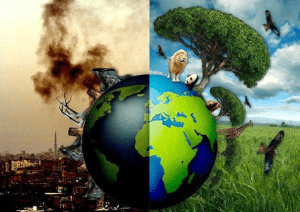Shanza Qamar
Email: [email protected]
Student of BS Journalism
University of the punjab, Lahore.
Environmental issues have become a pressing concern in recent years, as the planet faces numerous challenges that threaten the delicate balance of ecosystems and human well-being. From climate change and deforestation to pollution and biodiversity loss, the world is grappling with a range of interconnected environmental problems. This article delves into some of the most critical environmental issues we face today, emphasizing the urgency of addressing them and exploring potential solutions.
Climate change is perhaps the most significant environmental issue of our time. The excessive emission of greenhouse gases, primarily carbon dioxide (CO2), has led to a steady increase in global temperatures, resulting in more frequent and intense heatwaves, extreme weather events, rising sea levels, and disruptions to ecosystems. Urgent action is required to reduce greenhouse gas emissions, transition to renewable energy sources, and implement sustainable practices to mitigate and adapt to the impacts of climate change.
Massive deforestation continues to wreak havoc on the world’s forests, which play a crucial role in maintaining biodiversity, regulating the climate, and providing vital resources. Deforestation not only contributes to climate change by releasing stored carbon into the atmosphere but also leads to the loss of habitat for countless plant and animal species. To combat deforestation, efforts must be made to promote sustainable logging practices, protect existing forests, and support reforestation initiatives.
Pollution in its various forms poses a significant threat to both the environment and human health. Air pollution from industrial emissions and transportation significantly impacts air quality, leading to respiratory problems and other health issues. Water pollution caused by industrial waste, agricultural runoff, and improper disposal of chemicals threatens marine life and contaminates drinking water sources. Addressing pollution involves stricter regulations, promoting cleaner technologies, and implementing effective waste management and recycling systems.
The loss of biodiversity, accelerated by habitat destruction, pollution, climate change, and invasive species, is a grave concern. The extinction of plant and animal species disrupts ecosystems, reduces resilience, and diminishes the availability of vital ecosystem services. Protecting biodiversity requires the preservation of natural habitats, the establishment of protected areas, sustainable land-use practices, and international cooperation to combat wildlife trafficking.
The unsustainable consumption of natural resources, including freshwater, minerals, and fossil fuels, is depleting finite resources at an alarming rate. This poses significant challenges for future generations, as essential resources become scarce, leading to conflicts and socio-economic instability. Transitioning to a circular economy, which focuses on reducing waste, recycling, and reusing materials, is essential for sustainable resource management.
The environmental issues outlined above represent only a fraction of the challenges facing our planet. Recognizing the urgency of these problems and taking collective action is crucial to protect the environment and secure a sustainable future for generations to come. Governments, businesses, communities, and individuals all have a role to play in implementing sustainable practices, supporting renewable energy, advocating for policy changes, and raising awareness about the importance of environmental conservation. Only through concerted efforts can we hope to mitigate the impacts of environmental issues and build a more resilient and thriving planet.

